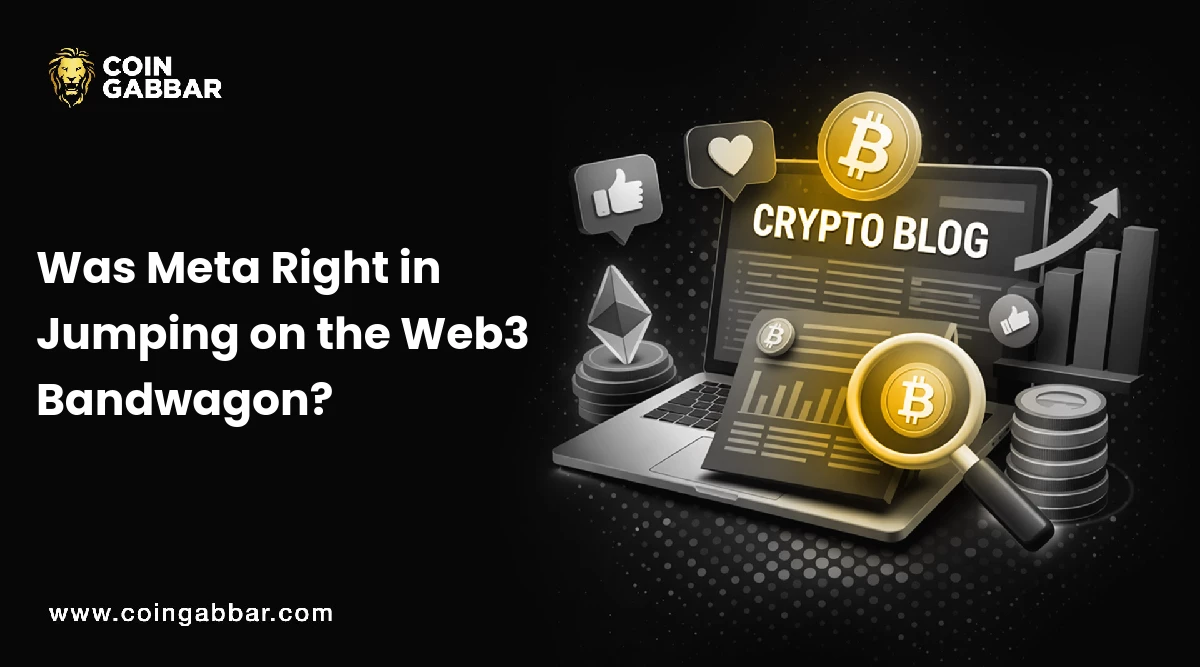
as the uncontested king of social networks,
maintaining its position as the leading force behind the most widely-used social media platforms across the globe. However, the company is currently undergoing a complete transformation, marked by a rebranding effort that will see it change its name to Meta.
This report critically analyzes Meta's strategic pivot and evaluates the steps taken by the company to evolve its core business model towards Web3. It aims to provide insights into Facebook's rebranding efforts and the reasoning behind its shift towards emerging technology.
While talking about the reasons behind the rebranding of Meta, its founder Mark Zuckerberg has already lectured for an hour and a half, sharing his passion for Metaverse comics since his childhood. There is no doubt in the fact that Zuckerberg and the team have well crafted a story that suits their rebranding narrative.
But interestingly, the series of these rebranding efforts are being depicted as a proactive step to suit future technology and change social media for good.
Though things are not that simple. It is hard to believe that Mark Zuckerberg after running Facebook on the same business model for the last 18 years, suddenly realized that his true passion lies in Metaverse. This sudden realization prompted a complete overhaul of the operational model of one of the most successful businesses of the century. This is not only hard to believe but also absurd for a business that is yet to reap the real profits of the data which it is accumulated over a decade.
Despite Facebook CEO Mark Zuckerberg's claims that this latest rebranding effort is aimed at revolutionizing social media, the reality is that Facebook has already become synonymous with unethical behavior in the industry. The recent revelations made in the Facebook papers by whistleblower Frances Haugen underscore the extent to which Zuckerberg's decisions are impacting the global population - often with detrimental consequences.
These reports were based on leaked documents and extensive interviews of former Facebook employees and became the basis of 100+ news stories. It also showed that Facebook has repeatedly contradicted, downplayed, or failed to report its company findings that showcase the harmful nature of its own products.
To give you a sense of the gravity of Facebook’s direct intervention in the socio-political order of the world, here is a list of the incidents in which Facebook’s direct involvement has been evident.
Content moderation failure and propagation of hate speech for Racial discrimination
Religious and ethnic violence in Myanmar
The extremity of hate speech and calls for genocide amidst the Ethiopian civil war
Racial slurs and abuses on Oculus Quest (Facebook’s VR Headsets)
Uncontrolled and uncensored hate speech propagation between Hindus and Muslims in India during CAA protests and Covid-19 lockdowns
Misinformative propaganda in Spain
Around 35% of Facebook users reported that they see hateful, disturbing, or sexually offensive content on their timeline
Misinformation and hateful propaganda that led to the Capitol attack in Washington
Inhumane live stream of the Christchurch attack on Facebook with no regulations whatsoever
These are only a handful of incidents that put the credibility of Facebook as a responsible social media platform under extreme doubt.
These efforts for rebranding Fabeboook are motivated by the aim to delude their customers from the extreme centrality of their platform and shadow their incompetence and inefficiency in controlling the misinformation and hate on a user-centric interface.
Facebook wants to build a new brand that is spotless and free from all these accusations. With this, it can be said that Facebook is opting for a rebranding, not because of the futuristic vision of its founder but to whitewash its tarnished image.
Apart from that Facebook has nothing new to offer to its users and in the next sections, we will dive deep into understanding how it became one of the main reasons behind the shift from Facebook to Meta.
Suffering Value of Facebook with Instagram Being the Only Cash Cow
As Facebook's reputation shifts from a platform for global connections to one plagued by hate speech, bigotry, and misinformation, its once-lauded innovation has stagnated. Any Facebook user out there would agree that it has become boring and the majority of the active users have shifted to Instagram, the prime money-making platform for Facebook.
Even though Whatsapp is extremely popular among the masses, it has a non-profitable revenue model based solely on Whatsapp Pay transaction fees and Business APIs. With little to offer its users and a reputation in tatters, the company is scrambling to incorporate emerging technologies and regain user interest.
Since the initial years of Facebook, it has made no serious updates to its value proposition and still continues on its old-fashioned connection model. On one hand, where other platforms such as Discord, Reddit, Twitter, and Telegram are making revolutionary changes in their operations, Facebook showed a serious lack of innovation on its platform.
As a result of which the total revenue and profits of Facebook have collectively fallen for the first time in the year 2021-2022 from record profits of $39,370 million to $23,200 million. This drop is also recorded because of a proposed investment of more than $19 billion in Reality Labs, Facebook’s VR and AR development unity.
While tech billionaires like Elon Musk are actively working towards shaping the future, Zuckerberg's relevance appears to be dwindling due to the ad-heavy nature of his social media platforms. It seems that the motivation behind his recent rebranding is driven more by a fear of missing out rather than a genuine desire to revolutionize the current state of social media. Unlike those who are truly disrupting the industry, Zuckerberg's approach seems to lack the innovation needed to propel his platforms forward.
Silicon Valley is in dire need of a truly innovative idea, as the world of software has been thoroughly explored and new innovations are increasingly difficult to come by. Companies that rely on exploiting laborers to create profitable tech-based services are finding themselves struggling to remain relevant in the coming years.
Most business models have been well established and are being replicated around the world, making it challenging for companies to distinguish themselves and maintain profitability. Without fresh and truly disruptive ideas, Silicon Valley risks falling behind in the tech industry.
The Metaverse, blockchain technology, and Artificial Intelligence have all passed the necessary checks for businesses seeking innovative solutions. Elon Musk has already been active in AI by founding OpenAI and now Microsoft and Google have also joined the party. But Facebook has chosen Metaverse as it suits the need of its core business and enable it to create a virtual world for its vast audience.
It's important to recognize that the potential applications of Web3 technology extend far beyond simply transforming a 2D ecosystem into a virtual reality platform.
At its core, Web3 is about decentralizing information and technology, which is becoming increasingly essential for businesses to remain competitive and compliant. Decentralization promotes transparency and accountability, which contrasts with Facebook's centralized decision-making authority.
As businesses adapt to meet the demands of a rapidly changing market, it's becoming clear that a Web3 approach is the way to go. But branding oneself as Meta and continuing to control and exploit user data for selfish benefits is nothing more than marketing propaganda.
As per the announcements made this Monday, Facebook is winding down the testing for integrating NFTs and digital collectibles on Facebook and Instagram to focus on its ‘priorities’. The company has said that it is looking forward to exploring other ways to incentivize the creators and minting and sharing of NFTs and another form of digital collectibles would not be possible.
Amidst this, the question arises that when Facebook is planning to steer its working model towards Web3, why NFTs are no more welcome to the ecosystem? The reason is that Facebook initially introduced these features to its ecosystem during the height of the NFT market's popularity. At the time, Facebook didn't want to miss out on the opportunity to capitalize on the trend and incorporate profitable elements into the Metaverse.
However, as the hype around NFTs has cooled off, Facebook is now reassessing its priorities. It is also true that Mark has jumped all the way into Metaverse with the sole aim of making Facebook relevant to the changing technologies and not innovating in the decentralized tech.
Facebook's decision to enter the Web3 space is a clear indication of the growing importance of decentralized technology and its potential to revolutionize traditional industries.
However, Facebook's past record in terms of user data privacy and ethical practices raises concerns about the company's intentions and ability to operate in a decentralized ecosystem.
While it remains to be seen whether Facebook's rebranding effort will succeed in improving its image and gaining user trust, it is clear that the company is putting its best foot forward to sync with the changing tech.

Pankaj Gupta is an accomplished Hindi Blog Writer and Chartered Accountant associated with Coin Gabbar, where he specializes in creating educational and impactful content on cryptocurrency, blockchain, and finance. His strong financial background and analytical mindset help bridge the gap between traditional finance and the evolving digital asset industry. Pankaj’s work reflects a commitment to simplifying complex ideas and delivering practical insights to readers. Outside of writing, he is passionate about reading, investing, trading, traveling, and philosophy, which continuously inspire his thought process and enhance the depth of his content.
8 months ago
Central bank digital currency news

2 years ago
good job facebook

2 years ago
nice

2 years ago
Best decision for the Facebook management.
2 years ago
nice
Are you looking for a crypto investment platform that's just right for you? Risk free, secure and profit Inclined, look no further than Mrs. Charlotte, contact her on the gram @Charlotte_Fridolin.
2 years ago • Danielle
2 years ago
THE COMMUNITY TEAM HIGHLY RECOMMENDS AND VERIFIED MRS KAREN TOMPSOM AS THE ONLY PROFESSIONAL TRADER TO AID YOU IN ALL TRADING RELATED ISSUES,,WRITE TO HER ON INST💹AG*RAM@{KARENTOMPSOM}
I'm impressed with the thoroughness and professionalism exhibited by this manager I joined and invested my last $4885USD and earned $12kBTC. MESSAGE AND FOLLOW HER ON ℹ️nst@g®️🅰️m at 👉 *KarenTompson* 👈
2 years ago • Jason jacksI will forever be indebted to you, you have changed my entire life and I will continue to preach on your name for the world' to hear that you save me from huge financial debt with little investment thank you very much
2 years ago • Isabella
2 years ago
nice

2 years ago
The best decision I ever made, was investing in financial markets with @chahaleyfx on I.G

2 years ago
Looking for long or short term Investment value for your Crypto asset? Stop the search. Find @Charlotte_Fridolin on Insta✅Gram🚀 for the best value for money.

2 years ago
nice
